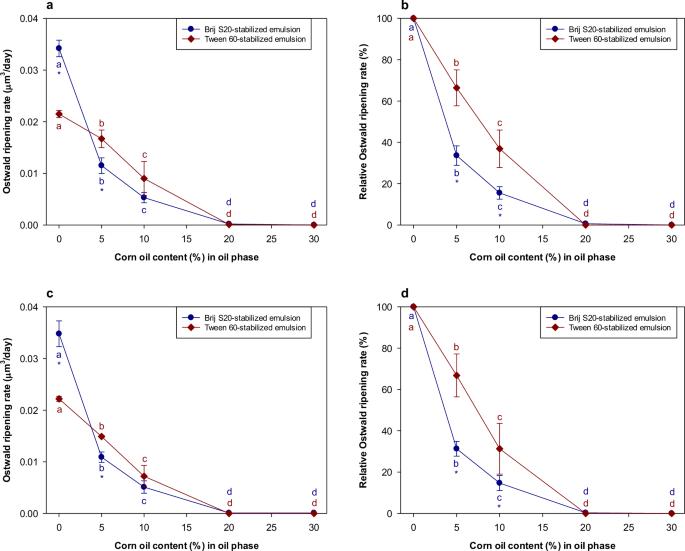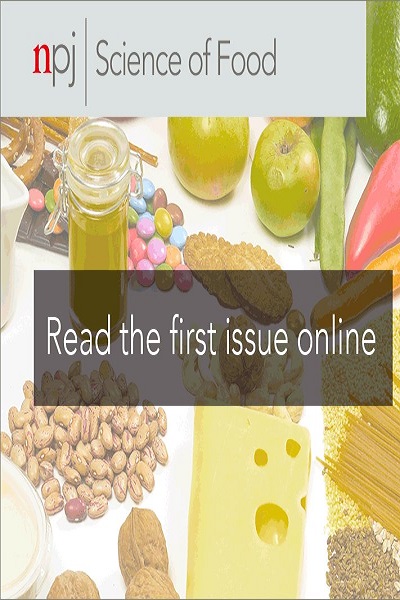亲水物质对由不同亲水基团表面活性剂稳定的乳液中奥斯特瓦尔德熟化的影响
IF 6.3
1区 农林科学
Q1 FOOD SCIENCE & TECHNOLOGY
引用次数: 0
摘要
本研究探讨了水溶性物质对由不同头基(Brij S20 和吐温 60)表面活性剂稳定的乳液中奥斯特瓦尔德熟化的影响。在油相中添加≥20%(w/w)的玉米油可有效抑制正癸烷乳液因成分熟化而产生的奥斯特瓦尔德熟化。无论乳化剂类型如何,乳液水相中葡萄糖、麦芽糖或甘油的存在都会降低奥斯特瓦尔德熟化率。然而,丙二醇的影响取决于乳化剂的类型,在 Brij S20 稳定乳液中会加速奥斯特瓦尔德熟化,但在吐温 60 稳定乳液中几乎没有影响。这种影响主要归因于丙二醇改变界面特性的能力。当使用正癸烷和玉米油混合物制造乳剂时,葡萄糖和麦芽糖仍能有效抑制奥斯特瓦尔德熟化,但甘油却失去了作用。这些结果对于配制保质期更长的乳液型给药系统具有重要意义。本文章由计算机程序翻译,如有差异,请以英文原文为准。

Impact of hydrophilic substances on Ostwald ripening in emulsions stabilized by varied hydrophilic group surfactants
This study investigated the impact of water-soluble substances on Ostwald ripening in emulsions stabilized by surfactants with different head groups (Brij S20 and Tween 60). Adding ≥20% (w/w) corn oil to the oil phase effectively inhibited Ostwald ripening of n-decane emulsions due to compositional ripening. The presence of glucose, maltose, or glycerol in the aqueous phase of the emulsions decreased the Ostwald ripening rate, regardless of emulsifier type. However, the impact of propylene glycol depended on emulsifier type, accelerating Ostwald ripening in Brij S20-stabilized emulsions but having little effect in Tween 60-stabilized emulsions. This effect was mainly attributed to the ability of propylene glycol to alter interfacial characteristics. When emulsions were fabricated with a mixture of n-decane and corn oil, glucose and maltose were still effective in inhibiting Ostwald ripening, but glycerol lost its ability. These results have important implications for formulating emulsion-based delivery systems with enhanced shelf life.
求助全文
通过发布文献求助,成功后即可免费获取论文全文。
去求助
来源期刊

NPJ Science of Food
FOOD SCIENCE & TECHNOLOGY-
CiteScore
7.50
自引率
1.60%
发文量
53
期刊介绍:
npj Science of Food is an online-only and open access journal publishes high-quality, high-impact papers related to food safety, security, integrated production, processing and packaging, the changes and interactions of food components, and the influence on health and wellness properties of food. The journal will support fundamental studies that advance the science of food beyond the classic focus on processing, thereby addressing basic inquiries around food from the public and industry. It will also support research that might result in innovation of technologies and products that are public-friendly while promoting the United Nations sustainable development goals.
 求助内容:
求助内容: 应助结果提醒方式:
应助结果提醒方式:


